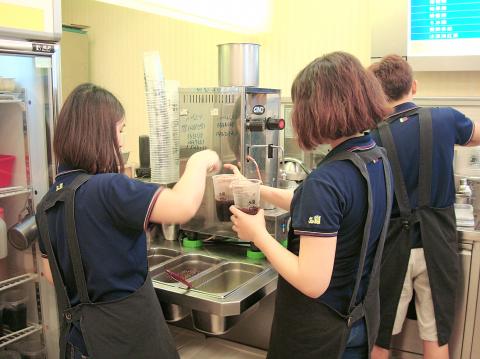Aletheia University said it hopes its application for radio frequency identification (RFID) technology can help alleviate consumer concern over hand-shaken soft drinks, following revelations some chain stores are using mixed tea leaves.
According to school of management professor Hong Chao-fu (洪朝富), there is no question concerning the quality of Taiwanese tea leaves, but the profit made using mixed leaves is too great.
Vietnamese-grown tea leaves cost NT$100 per kilogram, while Taiwanese tea leaves cost NT$3,000 per kilogram, Hong said, adding that mixed leaves have become common due to a lack of certification measures.

Photo courtesy of the Department of Health
Hong said it was during a conversation with an alumnus of the school that the third-party certification concept came into being.
The concept entails using cameras to capture the processing procedure of tea leaves, then uploading the footage to a cloud server, Hong said.
Tea factories working with the project could later put an RFID tag on tea packaging, allowing consumers to access the stored data on the cloud server via the Near Field Communication (NFC) system on smart phones, Hong said.
Tea factories were reluctant to cooperate with the project due to the “secret touch” each factory uses to handle their tea leaves, Hong said, adding that they persuaded owners to try the project as the cameras are set on wide-angle view.
It would be close enough to capture the process of making and packaging tea leaves, but not close enough to capture the secrets of the factories, Hong said.
It took at two days, of ceaseless filming to record an entire process.
Hong said he believed that only by recording an entirely transparent packaging process would the project become credible, adding that he hoped the government would take over the project as it would be more credible.
Chen Ping-kuo (陳屏國), another member of the project said, the RFID tag would include algorithms that would prevent hacking or faking data by asking for confirmation with the cloud server.
Since the tags are linked directly to cloud servers and the team has established a center to monitor all information, any fake data would not show up when the consumer scans the tag, Chen said.
Chen said that compared with QR codes, RFID tags are able to carry more data and are less likely to be forged, adding that the tags would allow a better degree of protection for the quality of Taiwanese tea leaves.
“The project aims to increase the value of Taiwanese tea leaves by at least 20 percent as well as attempting to eradicate the problem of tea factories attempting to mix leaves to maximize profit,” Hong said.
Hong added that the project would also seek to induct students and allow them to gain some practical experience.
Students that have selected courses in practical implementation of e-commerce and the digitization of businesses would be able to participate in the project and visit the tea factories, Hong said.
The project would also induct students from the department of Taiwanese literature in hopes of increasing the project’s cultural creativity, Hong said.
“The project might help the Taiwanese tea industry to pull out from the shadows cast by food security,” he said, adding that the technology could also be used in the production of coffee beans and other produce.

An essay competition jointly organized by a local writing society and a publisher affiliated with the Chinese Communist Party (CCP) might have contravened the Act Governing Relations Between the People of the Taiwan Area and the Mainland Area (臺灣地區與大陸地區人民關係條例), the Mainland Affairs Council (MAC) said on Thursday. “In this case, the partner organization is clearly an agency under the CCP’s Fujian Provincial Committee,” MAC Deputy Minister and spokesperson Liang Wen-chieh (梁文傑) said at a news briefing in Taipei. “It also involves bringing Taiwanese students to China with all-expenses-paid arrangements to attend award ceremonies and camps,” Liang said. Those two “characteristics” are typically sufficient

A magnitude 5.9 earthquake that struck about 33km off the coast of Hualien City was the "main shock" in a series of quakes in the area, with aftershocks expected over the next three days, the Central Weather Administration (CWA) said yesterday. Prior to the magnitude 5.9 quake shaking most of Taiwan at 6:53pm yesterday, six other earthquakes stronger than a magnitude of 4, starting with a magnitude 5.5 quake at 6:09pm, occurred in the area. CWA Seismological Center Director Wu Chien-fu (吳健富) confirmed that the quakes were all part of the same series and that the magnitude 5.5 temblor was

The brilliant blue waters, thick foliage and bucolic atmosphere on this seemingly idyllic archipelago deep in the Pacific Ocean belie the key role it now plays in a titanic geopolitical struggle. Palau is again on the front line as China, and the US and its allies prepare their forces in an intensifying contest for control over the Asia-Pacific region. The democratic nation of just 17,000 people hosts US-controlled airstrips and soon-to-be-completed radar installations that the US military describes as “critical” to monitoring vast swathes of water and airspace. It is also a key piece of the second island chain, a string of

The Central Weather Administration has issued a heat alert for southeastern Taiwan, warning of temperatures as high as 36°C today, while alerting some coastal areas of strong winds later in the day. Kaohsiung’s Neimen District (內門) and Pingtung County’s Neipu Township (內埔) are under an orange heat alert, which warns of temperatures as high as 36°C for three consecutive days, the CWA said, citing southwest winds. The heat would also extend to Tainan’s Nansi (楠西) and Yujing (玉井) districts, as well as Pingtung’s Gaoshu (高樹), Yanpu (鹽埔) and Majia (瑪家) townships, it said, forecasting highs of up to 36°C in those areas